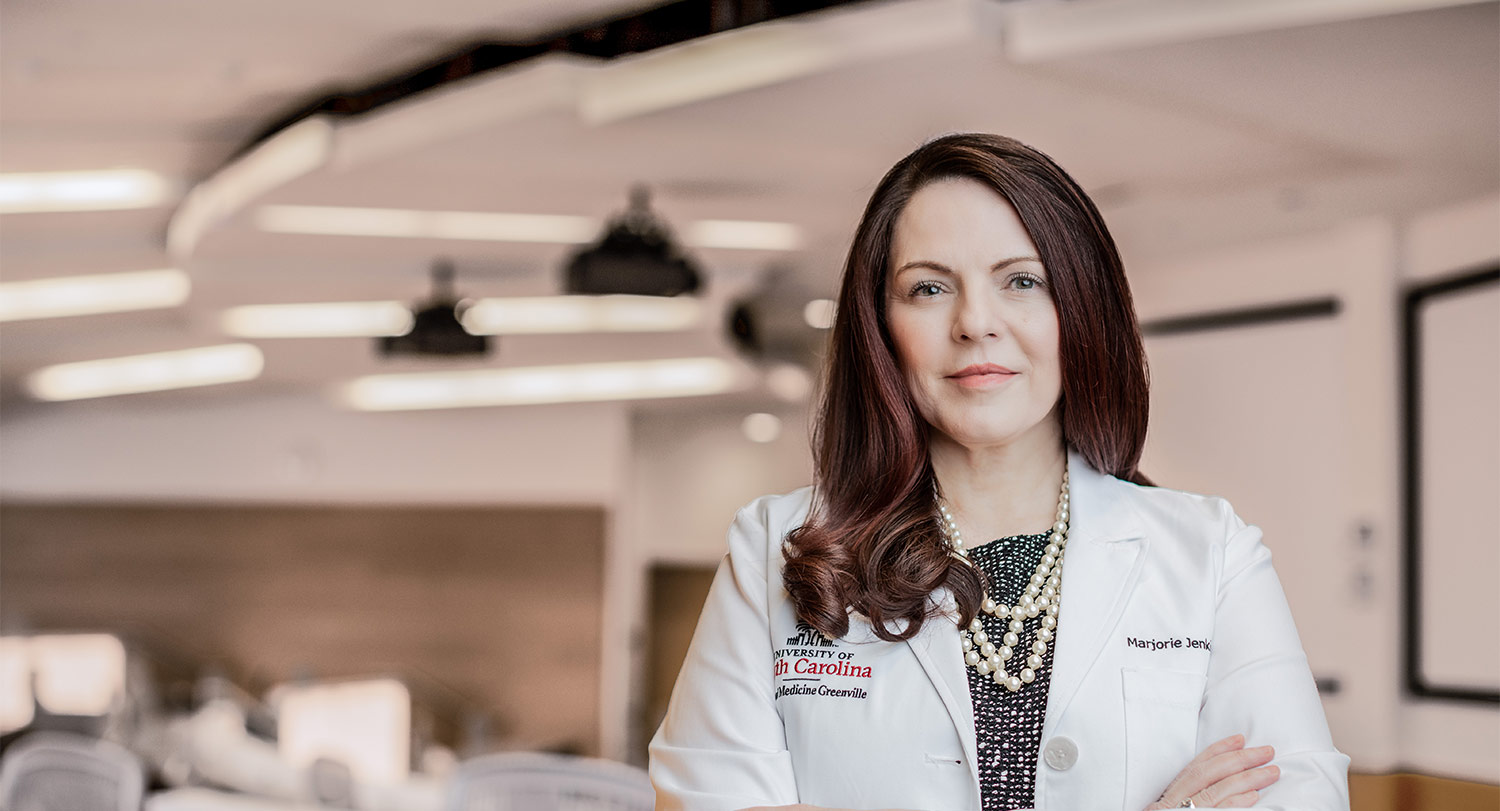
For Marjorie Jenkins, being a traditional medical school dean wasn’t on her bucket list of career goals, so she had never envisioned that role for herself.
That changed in 2019 when she learned about the University of South Carolina School of Medicine Greenville, and its goal to be a “deliberately different” kind of medical school training a different kind of physician.
Jenkins had spent the previous four years as director of medical and scientific initiatives for the Food and Drug Administration’s Office of Women’s Health in Washington. Before that she was a professor of medicine and associate dean at Texas Tech University’s Health Sciences Center and founder and chief scientific officer of the Laura W. Bush Institute for Women’s Health.
In 2019, she was preparing to head back to Texas Tech — until her husband sent her the job listing for the dean at the USC School of Medicine in Greenville.
“He said, ‘This really sounds like you. It’s a different kind of medical school. You’d be a different kind of dean.’”
Soon after, her long-time career advisor sent her the same listing.
“There were 27 open deanships in the country, and I received USC Greenville’s twice in the same week,” Jenkins says. “And then I was contacted by a search firm to see if I would interview for one of the open deanships. And I said, ‘Where is it?’ And it was in Greenville.
“I have a lot of blind faith and try to grow where I’m planted. But whether you have blind faith or not, the universe is talking to you at that point. So I said, ‘I’m going to apply.’”
An ambitious med school in a thriving city
What she found was a young medical school – it was seven years old in 2019 — that is committed to educating and producing a new type of physician, offering a technologically advanced medical school environment, and addressing an ongoing shortage of doctors in a rapidly growing state.
The city was a great fit, too. Jenkins says she and her husband were glad to be back in the Southeast, in a city that boasts a thriving downtown with excellent dining and entertainment options, a minor league baseball park in the heart of the city, Falls Park, the Swamp Rabbit Trail and plenty of recreation and healthy living opportunities.
She quickly became involved in the community and serves on the board of several local organizations, including the Greenville Symphony Orchestra, Artisphere and the City Club, and is an active member of the Greenville Chamber’s Accelerate 2.0 Leadership Council. She has recently been elected to the board of directors for the Institute of Medicine and Science for South Carolina and the Greenville Chamber of Commerce.
A holistic approach to admissions — and education
Jenkins also realized what the medical school means for the Upstate – and for South Carolina’s aspiring physicians. She saw the School of Medicine Greenville as a place that would give an opportunity to students “who may have never heard, ‘You can be a physician; you can go to med school.’”
That was particularly important to Jenkins, who grew up in rural Appalachia where a high school guidance counselor told her she couldn’t be a doctor because her family was too poor. She ended up studying chemical engineering as a first-generation college student before attending medical school. She understands the importance of a holistic approach to med school admissions.
“We’re not new anymore, but we are still young. And you know what? We’re small enough to be agile and innovative, and big enough to make a difference.”
“Our medical school doesn’t rely just on numbers to admit someone,” Jenkins says. “Yes, GPA matters, MCAT (the Medical College Admission Test) scores matter. But at the end of the day, we want to create the best clinicians and we seek to have people come into our medical school who are good communicators, who are dedicated to their communities. We want our graduates to go back into the communities within South Carolina.”
South Carolinians make up 70 percent of this year’s first-year class, up from 60 percent when Jenkins arrived as just the second dean of the Greenville medical school.
Along with geography, the School of Medicine Greenville and its partner Prisma help educate students on the importance of understanding the business of health care. She shared a recent survey indicated 78 percent of physicians who are graduating residency programs express a preference to be employed by a health system.
That’s why she believes it is so important that School of Medicine Greenville students are quickly exposed to the business of medicine along with the communities they serve and the technology that is needed to drive health care.
“When I say, ‘develop a different kind of physician,’ what that means is integrating the med school within the health system and the students within delivering health care,” she says. “Within the first days of them showing up on our campus, our students are interviewing patients. They are riding with the EMTs. We were one of the first in the nation to model that EMT training.”
Students become certified EMTs within the first months of med school, which connects them to the community and allows them to meet patients. When the health care system needed help delivering vaccines for COVID-19, the EMT-certified students were able to step in and provide the service to the community. Students also have completed more than 12,000 volunteer hours in the community since the school was founded.
Meeting needs, driving growth
Creating more primary care providers is particularly important in South Carolina, a rapidly growing state that is 700 primary care physicians short of what is needed to serve residents, with the number projected to grow to 800 by 2030, Jenkins says.
That’s why it is important for the med school to grow and serve the region. In 2012, 48 students started attending classes at the school. Now there are 432 medical students across four years, with plans to grow to 500. The Greenville medical school also tracks its economic impact on the Upstate region, which was estimated at $450 million at the school’s 10-year mark.
“That growth and the ability for the school to really deliver a high-tech, integrated immersion for our students within the health system really helps us to be a different kind of medical school,” Jenkins says. “We’re not new anymore, but we are still young. And you know what? We’re small enough to be agile and innovative, and big enough to make a difference.”
She’s also sold on the city of Greenville — for herself, and her family.
“I cannot give Greenville a bigger vote of confidence than the fact that all three of our children moved here to work,” she says. “The economic development here is just so great for young people.”
